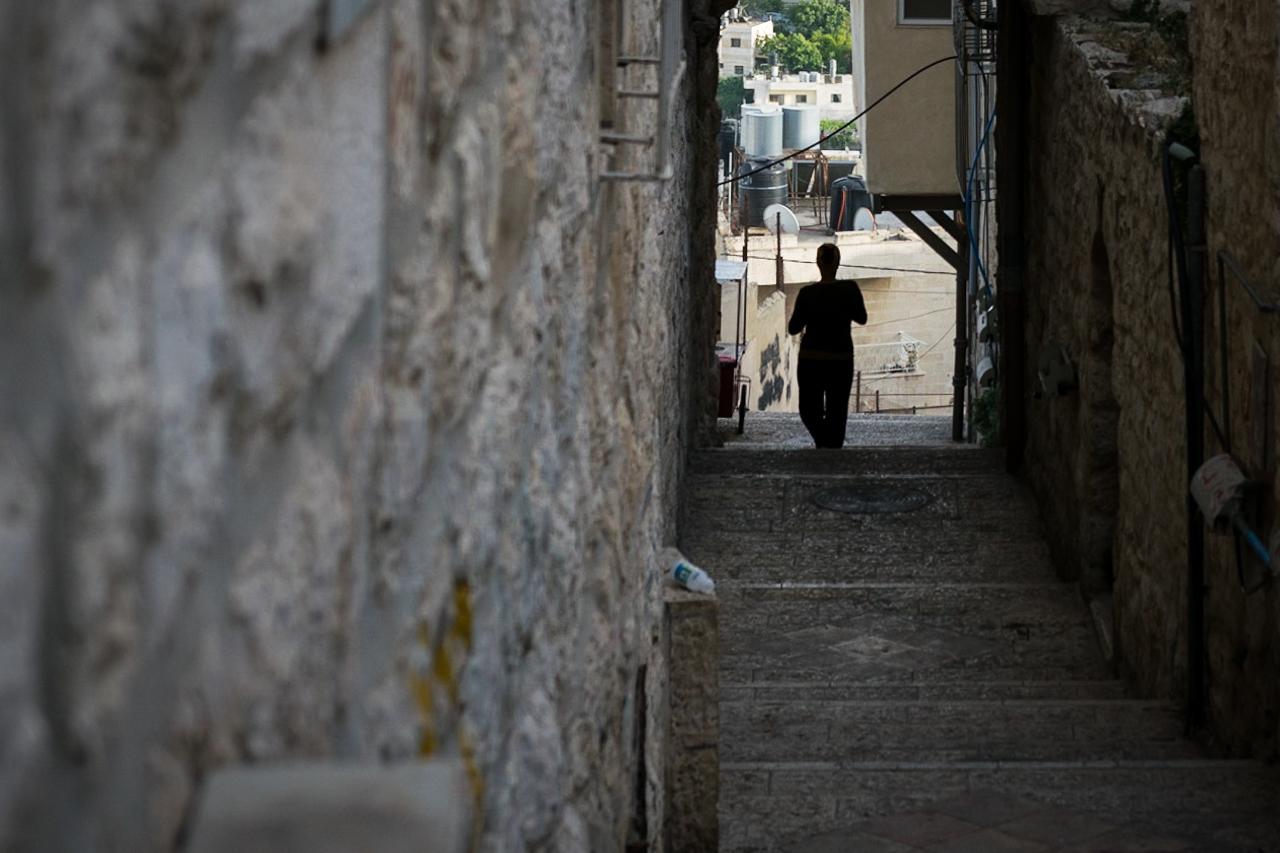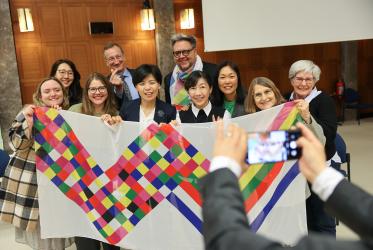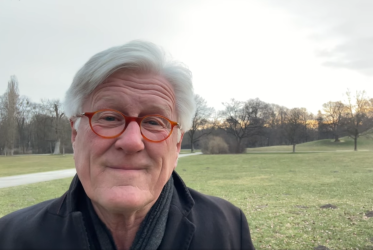Erik Apelgårdh first offered this reflection in 2016 at the Church of Reformation, Evangelical Lutheran Church of Jordan and the Holy Land Church in Beit Jala.
Luke 1:46-55
The night is warm and I'm unable to sleep. I walk around in the small town; the darkness is blue. This moment I see her for the first time. I see her just as a silhouette. I see her lying on a mat on a roof, but all of a sudden the silhouette sits straight up and seems to be concentrating as she is listening to someone. I can't hear anything. She rises from the mat and start looking at the stars and the moon as she is thinking and might be worried. I'm getting a bit closer and could hear her singing: "My soul magnifies the Lord, and my spirit rejoices in God my Savior, for he has looked on the humble estate of his servant..."
Next time I see her she is running, but not as she trying to flee. Her running is more of a dancing, a running full of joy, and running for fun. Sometimes she stops to look on the view or some flowers. I not quite sure why I'm so interested in her, maybe it's something in her eyes or how proud she looks, full of confidence. She is on her way to a village, something or someone makes me follow her at a distance. She is meeting an elderly woman, could be her mother or grandmother. They also greet one another with a hug. I can hear laughter and giggling, but I do not hear what they are talking about.
Years pass by and I have not seen her for many years. I have heard that she received a son at the time when all of us had to move around to be registered in the Roman registration.
According to my memory her husband had a connection to Bethlehem.
This time it's the days after Passover. We are all on our way back to our homes from Jerusalem. Now I see a mature woman walking around on the road asking everyone if they have seen a boy coming alone or a boy that seems to be lost, separated from his elders and relatives.
Once more I decide to follow her at a distance; she is turning back and is walking towards Jerusalem. I feel forced to experience what's going on. There in the temple there is a crowd mainly of elderly men. I stretched myself to see, and I see a boy talking and arguing with the men, Pharisees and other temple priests. The woman, who I have followed, Mary, is forcing herself through the crowd. She has been worried and afraid because the loss of the son, now I can see that her eyes are black and she starts to scold the boy. He is in the age when boys are full of hormones and he has just turned 12, so he behaves towards her as he is superior to her. He makes some remarkable statements as explanations for his remaining in Jerusalem and the temple instead of following the others. Her eyes look at him with anger and surprise; he has insulted her in front of the crowd.
Next time I also see an angry woman with dark eyes walking on the streets of Nazareth. It's almost possible to hear the sound of her feet hitting the ground while she is walking. She is not alone, there some young men trying to keep up with her speed. She stops outside a house, starts to argue with some individuals standing outside. I get near the house, I want to hear what will take place. Mary is upset and angry; she thinks her son is making her, himself and the family a talk of the town. She is eager to bring things back to ordinary life and wants him to come to his senses. From the inside of the house there are words coming that are like slaps on her face: "Who is my mother, and who are my brothers?" He is denying her and his brothers; I can see tears coming to her eyes. She turns around and leave, her head is bent, her steps have lost their vitality. The people outside the house follow her with their eyes, whispering. Some are shaking their heads, others are pointing to their heads, some do not know what to think. How could he reject her? She has raised him, his brothers and sisters - wasn't he cruel to her? Some think she deserves it: who is she to oppose a man, the head of the family?
During the years to come she is known to be one of the women following Jesus from Nazareth around, her eldest son, the man who is gathering big groups, people who want to hear him preach or are just curious about who he is. His talent as a speaker is known as well as his capability to argue with the religious elite. The stories about how he makes them silent are heard about, and his healing is known.
Passover is here again. I’ve heard some rumors; the elite is trying to silence Jesus. It’s said that he is threat to their positions and influence. The city is crowded with people; Jesus is at the temple. The groups around are fewer in number compared to one year back. I see Mary again, now an elderly woman. I can see worries and concern in her eyes. She also looks tired. Her hair is now grey and upon her face the years have made their marks, marks of joy and laughter, of sorrow and concern. Still, she looks healthy. There is also a different look in the face of Jesus. It’s more troubled than I can remember, it looks like he is very tired. His skin has lost some of its color. Sometimes I get the impression that he is somewhere else. I could also see that Mary is more focused on Jesus, more caring than I remember.
It’s night again and the news has spread in the circles around Jesus that he is under arrest by the Romans, and also handed over to the high priests and back again to the Romans. Outside the residence many are gathered. I think I saw Peter at the gate, and of course Mary, together with some other women. I can’t see her face clearly but she looks scared and in despair. A decision is made that he will be crucified.
I didn’t have the courage to be close to the crucifixion, so I stayed in the background, but among others I see her, Mary, again. She is crying and the tears have made marks on her cheeks, small creeks in the dust upon her face. She is leaning on a man that I recognize as one who was very close to Jesus. Now she has turned old, she is grey. In all her sadness she is still able to look with love upon her firstborn son, staying with him through his suffering. It seems that they are exchanging a few words with one another.
To my knowledge comes very strange information, I think it’s gossip – the tomb is empty. The body of Jesus is not in the grave.
But several people tell me it’s true they have met the resurrected Jesus from Nazareth. They tell me that Mary was among the first ones at the empty tomb.
I’m walking in Jerusalem at night, from one house I hear a woman singing: “My soul magnifies the Lord and my spirit rejoices in God my Savior, for he has looked on the humble estate of his servant. For behold from now on all generations will call me blessed; for he who is mighty has done great things for me, and holy is his name..."
And the time has already come not only to describe a Palestinian woman or try to interpret her life, as I have done. Since a long time we should have listened to her story. Listened to her visions for her life, listened to her concerns, listened to her relationship to Jesus Christ. Actually not only listened, joined her. Joined her in the struggle for justice, for peace, for gender justice against violence to her sisters, to oppose the situations where children grow up under occupation and war.
Mary, a Palestinian woman, trusting in promises given in her youth, remaining faithful and hopeful, not only in joy and happiness, even when her life consisted of despair, sorrows, grief, disappointment, she relied on the promises given to her and also expecting not to be let alone or abounded. She knew that the Holy Spirit was upon her, and that the power of the Most High was overshadowing her. The promise is also given to us, we can sing with Mary, singing out our hope, reminding ourselves of the promises given to her and to us. Those promises bring us hope through her, even when situations are without hope. "He has brought down the mighty from their thrones and exalted those of humble estate; he has filled the hungry with good things, and the rich he has sent away empty."
"May we with her, surrender ourselves to your command and lay upon your altar our gifts of heart and hand."
AMEN







